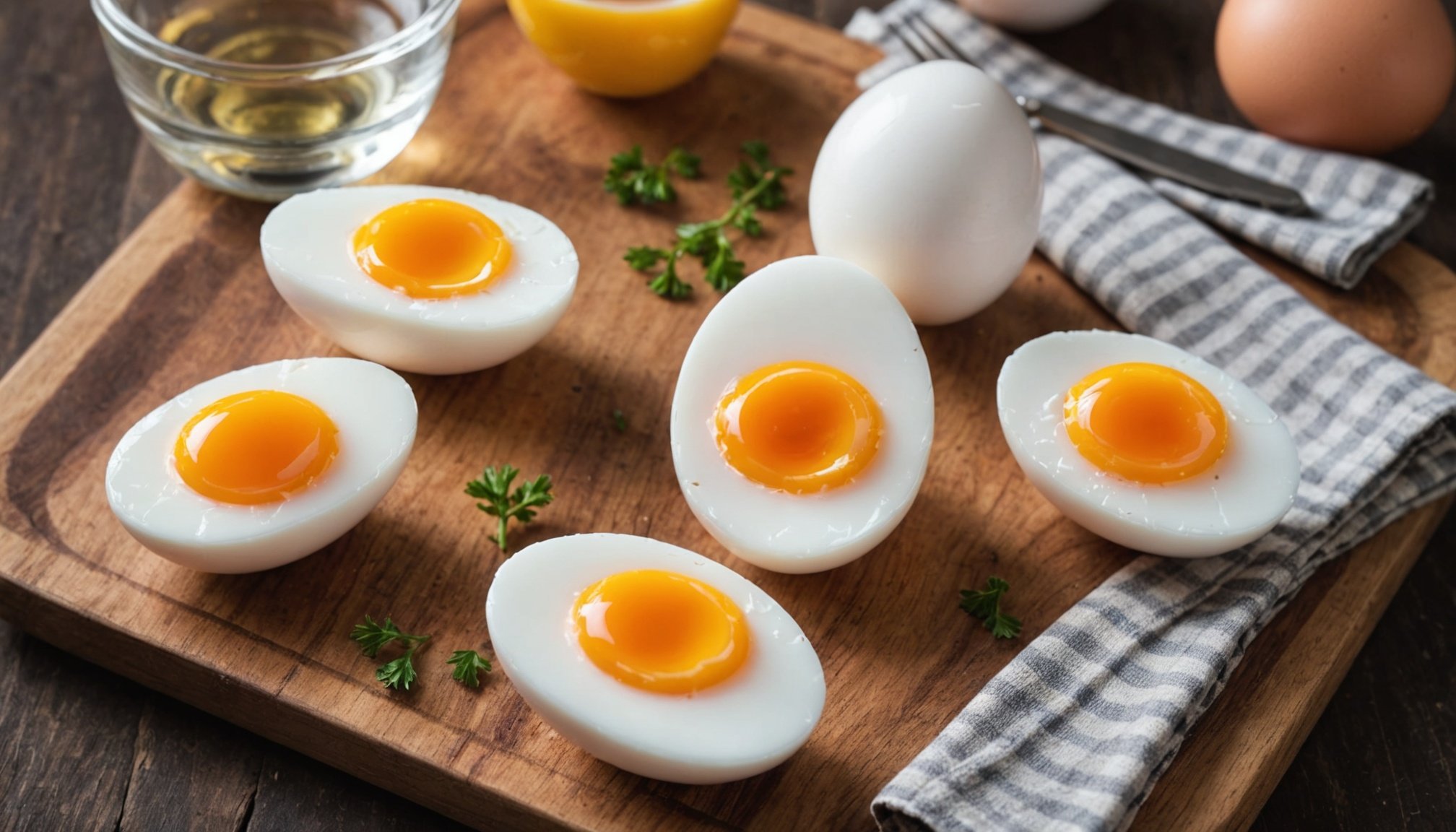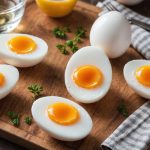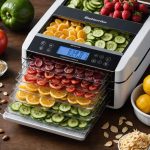Understanding Soft-Boiled Eggs
Soft-boiled eggs are cherished for their unique blend of textures, offering a firm egg white and a luscious, runny yolk. Achieving this perfect consistency depends largely on precise cooking techniques.
The cooking process for soft-boiled eggs requires a keen understanding of temperature and timing. Typically, the egg preparation involves boiling eggs for a precise duration, usually between 6 to 7 minutes, depending on egg size and initial water temperature. During this time, the whites set perfectly while maintaining a creamy yolk. The key is to swiftly transfer the eggs to an ice bath post-cooking, halting the cooking process and preserving the desired texture.
Additional reading : Mastering flavor: your comprehensive handbook for choosing the perfect food dehydrator to preserve nutrients
From a nutritional standpoint, soft-boiled eggs offer significant benefits. They are an excellent source of high-quality protein and provide essential vitamins such as B2 (riboflavin) and B12, vital for metabolic functions and red blood cell formation. Additionally, soft-boiled eggs retain more nutrients compared to other methods, as the cooking time is shorter, minimizing nutrient loss.
By understanding the interplay of temperature, timing, and preparation, cooking the ideal soft-boiled egg becomes an achievable task, enriching meals with both nutrition and flavour.
Also to see : Enhance your culinary space: discover the advantages of magnetic knife strips for safety and organization
Choosing Quality Eggs
Selecting the right eggs is crucial for quality performance in cooking and baking. When seeking fresh eggs, several factors should be considered. Egg quality can be distinguished through differences in egg types and assessments of freshness.
Firstly, understanding the differences between organic, free-range, and conventional eggs is important. Organic eggs come from hens fed with organic feed without synthetic additives. Free-range eggs mean hens have some outdoor access. Conventional eggs often provide the lowest cost option but may come from hens in confined environments. Exploring which option fits your needs can enhance your culinary results based on ethical and nutritional preferences.
To assess egg freshness, the water test is a simple method. Submerge an egg in water: if it sinks and lays flat, it is fresh; if it stands upright or floats, it’s less fresh. Additionally, a visual inspection is key. Check the shell; it should be uncracked and clean for optimal quality. These techniques ensure you choose the best eggs, aligning with your values and requirements.
Incorporating these methods into your routine helps guarantee optimal egg quality for all your culinary endeavors. This attention to detail elevates both your food’s taste and texture.
Overview of Egg Timers
Egg timers are indispensable kitchen tools, designed to help achieve the perfect boiled egg consistency. Understanding the different egg timer types and their unique features can significantly enhance your cooking experience.
Types of Egg Timers
There are three primary types of egg timers: digital, mechanical, and classic. Digital egg timers often come with advanced features like LED displays and audible alarms, offering precision with easy usability. Mechanical timers, typically operated with a simple twist mechanism, rely on coiled springs to count down time. The classic sandglass timers provide a traditional, visual approach to timing, using sand for measuring intervals.
Features to Consider
When selecting an egg timer, key features to evaluate include the timer functionality, such as adjustable settings for different egg sizes, durability, and ease of use. Digital timers offer versatility with programmable settings. In contrast, mechanical and sand timers are often appreciated for their simplicity and durability.
Pros and Cons
Each type has its pros and cons. Digital timers provide precision but require batteries. Mechanical models are battery-free but may wear out over time. Classic timers offer a visually appealing, straightforward method though they’re less precise. Choosing the right one depends on personal preference and intended use.
Reviews of Popular Egg Timers
In the world of egg timers, selecting the right one often hinges on product comparisons and user feedback. Below, we delve into popular choices to help you make an informed decision.
Top Recommended Egg Timers
When examining the features of top-rated egg timers, common highlights include ease of use, durability, and precision. Users often praise the accuracy of timers that can handle varying egg sizes and doneness preferences. Many egg timers receive favourable user ratings, often cited for their reliability in achieving perfectly cooked eggs. The price range of these timers varies, but generally affordable options are available without compromising on quality, offering great value for money.
Innovative Egg Timers
For those seeking modern solutions, innovative egg timers present unique designs. Options like digital timers with pre-set functions or voice commands cater well to tech enthusiasts. User experiences with these gadgets are generally positive, emphasising convenience and technological integration. Among the best choices for tech-savvy cooks are timers with app connectivity, allowing remote controls and customisation. Such features not only add a touch of novelty but also enhance cooking efficiency for those eager to embrace kitchen technology.
Cooking Techniques for Perfect Soft-Boiled Eggs
Achieving the ideal soft-boiled egg requires precision and the right cooking methods. Begin by selecting the appropriate boiling techniques to ensure consistency. Place eggs in a pot and cover them with water, ensuring they are completely submerged. Start with high heat until the water boils, then reduce to a gentle simmer. Timing guidelines are crucial here – for large eggs, boil for approximately 6 minutes; adjust the time slightly for medium or extra-large eggs, about 5 and 7 minutes, respectively.
Alternative cooking methods can also produce excellent results. The sous vide technique allows for precise temperature control. Set the water bath to 63°C (145.4°F) and cook the eggs for 45 minutes. This method ensures even cooking and the perfect texture every time.
Consider experimenting with different sizes and freshness of eggs, as these factors can influence the cooking duration. By following these step-by-step instructions and optimal timing, you’ll be well on your way to enjoying soft-boiled eggs with a creamy yolk and perfectly set whites. Embrace the journey of mastering these techniques, and delight in the satisfying results of this simple yet delicious creation.
Troubleshooting and Common Mistakes
Cooking soft-boiled eggs can lead to a variety of issues if not performed correctly. Whether your eggs turn out too runny or too firm, understanding common cooking mistakes is crucial. One frequent slip-up is not timing the eggs properly. Even a minute longer can change a soft-boiled texture to hard.
Avoiding Pitfalls
To achieve that perfect consistency, start by bringing your water to a gentle boil before adding eggs. Using a timer is essential. Depending on egg size, a 6 to 7-minute boil often yields the desired result, but always use the same size eggs for consistency.
Troubleshooting Undercooked Eggs
If your soft-boiled egg is too runny, it might have been removed from heat prematurely. Increasing the cooking time slightly can help. Conversely, if the eggs are overcooked and have a hardened yolk, reduce future cooking times by 30 seconds until the desired softness is achieved.
Consistent Results
For reliability, use eggs at room temperature. Applying a consistent method will allow for fewer variables, improving outcomes. Recognising and correcting common cooking mistakes will lead not only to better eggs but also increased confidence in your cooking skills.
Recipes Featuring Soft-Boiled Eggs
Soft-boiled eggs are incredibly versatile and can elevate a variety of culinary creations. Whether you’re a seasoned chef or a kitchen novice, incorporating these delicious gems into your meals can be both rewarding and effortless. Let’s explore some creative soft-boiled egg recipes.
From hearty ramen bowls to refreshing salads, soft-boiled eggs add a creamy richness that enhances any dish. Smoky ramen becomes a culinary masterpiece when adorned with a delicately soft egg that bursts with flavour. To create a salad that sings, toss in a soft-boiled egg for a boost of protein and luscious texture, pairing beautifully with sharp cheeses and tangy dressings.
When it comes to quick meal ideas, simplicity is key. Consider a soft-boiled egg atop an avocado toast, sprinkled with red pepper flakes for a spicy kick. You could also create an easy rice bowl: layer steamed rice, sautéed vegetables, and top with a soft egg for a satisfying and quick dinner solution.
By incorporating soft-boiled eggs into your culinary repertoire, you not only enjoy their deliciousness but also enrich your meals with a versatile ingredient that pairs effortlessly with a multitude of flavors. Experimenting with different recipes is a delightful way to appreciate their unique qualities.











